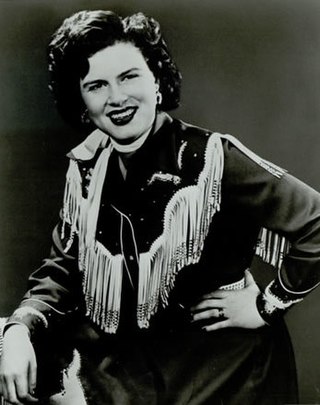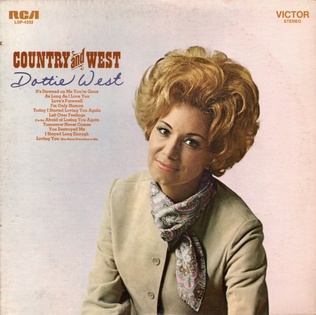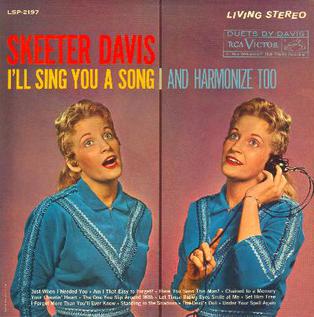Related Research Articles

"The End of the World" is a pop song written by composer Arthur Kent and lyricist Sylvia Dee, who often worked as a team. They wrote the song for American singer Skeeter Davis, and her recording of it was highly successful in the early 1960s, reaching the top five on four different charts, including No. 2 on the main Billboard Hot 100. It spawned many cover versions.

Cute 'n' Country is the second studio album by American country music artist Connie Smith. It was released in October 1965 via RCA Victor Records and contained 12 tracks. Cute 'n' Country contained a mixture of original songs and cover versions by other country artists. Featured on the album was the top ten single "I Can't Remember". Cute 'n' Country was Smith's second album to top the Billboard country LP's chart.

The discography of American music artist Patsy Cline consist of three studio albums, 24 singles, six extended plays, one compilation album, six other charted songs and one album appearance. Cline's discography contains material released during her lifetime. Her first recordings took place under the direction of Four Star Records. Cline's first single, "A Church, a Courtroom, Then Goodbye," was released in July 1955. Four Star issued 17 singles during Cline's four years recording with them. However, only "Walkin' After Midnight" (1957) became a major hit, reaching number 2 on the Billboard country songs chart and number 12 on the Billboard pop music chart.

Country and West is a studio album by American country music artist Dottie West. It was released in May 1970 on RCA Victor Records and was produced by Danny Davis. Her fourteenth studio album, Country and West spawned one single that became a minor hit on the national publication charts in 1970. It was also one of three studio albums West would release in 1970.

"Color Him Father" is a song written by Richard Lewis Spencer and recorded by American rhythm and blues group the Winstons. It was released in 1969 as their debut single for Metromedia and was a No.7 hit on the Billboard Hot 100 that year, representing the Winstons' highest entry there. A cover by American singer Linda Martell on Plantation Records also charted in the same year, reaching No. 22 on the Hot Country Songs chart.

The discography of American country artist Skeeter Davis contains 32 studio albums, 18 compilation albums, 59 singles, 53 lead singles, six collaborative singles, two other charted songs and two additional appearances. Davis was first one half of the duo, The Davis Sisters before embarking on a solo career with the RCA Victor label. Her second single was 1957's "Lost to a Geisha Girl", which reached the top 15 of the American Billboard Hot Country Songs chart. It was followed in 1959 by the top five country selection, "Set Him Free". The same year, Davis's debut studio album was issued on RCA Victor titled I'll Sing You a Song and Harmonize Too. Her career momentum continued to build in 1960 with two top five back-to-back singles: "(I Can't Help You) I'm Falling Too" and "My Last Date ". Both selections also climbed into the Billboard Hot 100 top 40. They were featured on Davis's second studio album called Here's the Answer. Between 1961 and 1962, Davis had top ten Billboard country singles with "Optimistic" and "Where I Ought to Be".

I'll Sing You a Song and Harmonize Too is the debut studio album by American country artist Skeeter Davis. The album was released in November 1959 by RCA Victor and was produced by Chet Atkins. It signified Davis' first solo album ever released after departing from the duo, The Davis Sisters.

Here's the Answer is the second studio album by American country artist Skeeter Davis. The album was released in January 1961 on RCA Victor Records and was produced by Chet Atkins. The album consisted of cover versions of hit singles by country artists and answer songs to the hits.

The End of the World is the fourth studio album by American country singer Skeeter Davis. It was released in March 1963 by RCA Victor. It includes the hit single "The End of the World", which peaked at number two on the Billboard Hot 100 pop chart.
Lillian Lorene Mann was an American country music singer and songwriter. She is known for her duets with Justin Tubb and Archie Campbell.
"Set Him Free" is a song written by Skeeter Davis, Helen Moyer, and Marie Wilson. In 1959, Skeeter Davis recorded and released the song as a single for RCA Victor.
"Where I Ought to Be" is a song written by Harlan Howard. In 1961, Skeeter Davis recorded and released the song as a single for RCA Victor in 1962.

"I Can't Stay Mad at You" is a song written by Gerry Goffin and Carole King. It was originally recorded by American country artist Skeeter Davis, becoming her second top-ten hit on the Billboard Hot 100 in 1963. "I Can't Stay Mad at You" followed on the popular success of Davis' earlier 1963 crossover hit "The End of the World". The song was one of the first Goffin-King compositions to be recorded by a country music performer.
"Going Down The Road Feeling Bad" is a traditional American folk song, "a white blues of universal appeal and uncertain origin".
"Tiny Blue Transistor Radio" is a song written by Bill Anderson that was originally recorded by American country music singer Connie Smith. It was released as the B-side to her 1965 single, "Then and Only Then". "Tiny Blue Transistor Radio" also became a charting country single, peaking within the top 40 of the national country survey in 1965.
"The Little Music Box" is a song originally recorded by American country artist, Skeeter Davis. It was composed by Davis herself, along with Rudy Thacker. It was released as a single in 1962 via RCA Victor and reached the top 30 of the American country songs chart.
"What Am I Gonna Do with You" is a song originally recorded by American country artist, Skeeter Davis. It was composed by Gerry Goffin and Russ Titelman. In 1964, it was released as a single via RCA Victor and reached the top 40 of the American country music chart. Although not originally released on album, it later appeared on the re-release of her sixth studio album titled Let Me Get Close to You.
"Bus Fare to Kentucky" is a song composed by Ronny Light and originally recorded by American country artist, Skeeter Davis. In 1971, it was released as a single via RCA Victor and reached the top 40 of the American and Canadian country music charts. It was released on Davis's 1971 studio album titled Skeeter
"Sad Situation" is a song composed by Clyde Pitts that was originally recorded by American country artist, Skeeter Davis. In 1972, it was released as a single via RCA Victor and reached the top ten of the Canadian country music chart. It was also released on Davis's 1971 studio album titled Skeeter

Porter Wagoner and Skeeter Davis Sing Duets is a studio album by American country artists, Porter Wagoner and Skeeter Davis. It was released in May 1962 on RCA Victor and contained 12 tracks. The album was collection of duet recordings between both performers. A total of 12 tracks comprised the album, most of which were covers of songs first recorded by other music artists. The album was given positive reviews at the time of its release.
References
- 1 2 3 Unterberger, Richie. "Skeeter Davis Sings the End of the World: Songs, reviews, credits". AllMusic . Retrieved 20 September 2022.
- 1 2 Whitburn, Joel (2008). Hot Country Songs 1944 to 2008. Record Research, Inc. ISBN 978-0-89820-177-2.
- ↑ Unterberger, Richie. "Skeeter Davis Biography". AllMusic . Retrieved 20 September 2022.
- 1 2 3 Davis, Skeeter (January 1962). ""Where I Ought to Be"/"Something Precious" (7" vinyl single)". RCA Victor . 47-7979.
- ↑ "Skeeter Davis Chart History (Hot Country Songs)". Billboard. Retrieved September 24, 2022.